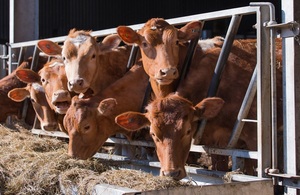£9.13 million awarded to develop cutting-edge farming technology
Robotic crop harvesting, a new way of cultivating potatoes and an autonomous cow bedding system receive share of funding.

Three cutting-edge projects will receive a share of £9.13 million in government funding to carry out research and development on proposals to boost agricultural productivity, sustainability and climate resilience, it has been announced today.
The funding will support projects developing robotic crop harvesting for horticulture, an autonomous system to change cows’ bedding to improve their health, welfare and productivity, and a more environmentally-friendly approach to potato cultivation.
The three projects are being supported through the Large R&D Partnership competition, which is part of the government’s £270 million Farming Innovation Programme, and a second round of the competition is currently open for applications.
This is all part of the government’s commitment to spend around £600 million on grants to provide support for farmers to invest in productivity, animal health and welfare, innovation, research and development over three years. It will be funded from the £2.4 billion annual farming budget, which is being maintained at its current level for the rest of this current Parliament.
Alongside the ongoing roll-out of the Environmental Land Management schemes, the grants will help to deliver long-term sustainable food production and support farmers to halt and reverse the decline of nature as set out in the Environmental Improvement Plan.
Farming Minister Mark Spencer said:
It’s important that we fund projects like these – and those still to come in future rounds – as we support farmers to deliver sustainable food production and protect the environment.
Innovation, research and development will help keep the sector at the cutting edge of technology as we look into the future.
Katrina Hayter, Interim Executive Director Healthy Living & Agriculture, Innovate UK, said:
These projects have all demonstrated not only an innovative solution to a real-life, on-farm problem, but also the value of partnerships and collaboration between different sector experts. For novel technology to truly succeed, it needs the input of the farmers themselves for the day-to-day realities of its use.
We’re really pleased that these partnerships have this idea at their core, and we now look forward to working with them as they develop their solutions further and bring the benefits to life.
Successful projects
The Agri-Opencore project, led by APS Produce, has been awarded over £3.8m to accelerate the delivery of robotic crop systems for horticulture. With labour shortages affecting the horticulture sector around the world, there are huge opportunities to reduce costs and labour requirements. The funding will help the project create the world’s first open development platform (software and hardware) for agri-robotic crop harvesting. The open development platform will enable multiple organisations to contribute, allowing cross-sector collaboration and demonstration of technologies on English farms. It is hoped that the project will help to accelerate the adoption of robotic picking by two years.
Phil Pearson, from APS Produce, said:
The AGRI-OPENCORE robotics project is an exciting, and vital project for the fresh produce industry. It promises to deliver the significant progress required to automate fresh produce harvesting in the UK. As this work brings leading technology providers, Dogtooth, Xihelm and Wootzano, with the academic excellence of the University of Lincoln team, we can expect significant progress towards autonomous harvesting.
The AG ARC project, led by Garnett Farm Engineering, has been awarded over £2.5m towards the development of an autonomous cow cubicle bedding unit. Cow comfort is a key factor in reducing the chances of cows suffering from mastitis, a fatal inflammation of their mammary gland, with dry and clean bedding and careful management of cubicles being vital. Currently, this must be done manually by farmers, but this project will develop an intelligent robotic cubicle bedder to monitor and respond to key sensor data to optimise dispensing of bedding. This will help to boost cow health and welfare, improve farm productivity and reduce costs through efficient use of bedding.
Andrew Garnett, of AG Products, said:
We look forward to collaborating with the University of Liverpool on this exciting project to further enhance our cattle bedding solutions to farmers, improving cow welfare and productivity. Our passion for innovation has seen the recent launch of the AG Duo; the AG ARC will further revolutionise the industry’s approach to cattle bedding..
The Potato-LITE project has been awarded £2,830,000 to explore optimised systems for potato cultivation. Current systems require the soil to be cultivated to create a deep and uniform seedbed, free from stones and clods, to provide a favourable environment for potato growth. Whilst reduced tillage technologies have enabled regenerative agriculture in cereal systems, this technology has not been developed for the production of potatoes and other root crops. Potato-LITE will transform potato tillage through developing new cultivation equipment and systems, delivered through a leading partnership between food manufacturers (PepsiCo and McCain), a machinery manufacturer (Grimme), growers (Strawson Ltd, JRO Griffiths, H Sutton & Son and JM Bubb & Son) and research organisations (Cranfield University, Harper Adams University and CHAP). The project focuses on reducing the depth, intensity and number of operations required, which will improve soil health and reduce the environmental impact of potato production whilst also reducing costs, making the £824 million potato sector more resilient and sustainable.
Shaunagh Slack, Project Lead for Potato-LITE, Regen Ag Scientist, Agricultural Science, PepsiCo, said:
At PepsiCo, agriculture is core to our business and we believe that sustainable agricultural practices are pivotal in protecting and enhancing our natural resources. Through Potato-LITE, we have a unique opportunity to form a leading industry and academic partnership to transform potato tillage and quantify the benefits on soil health and greenhouse gas emissions. This four year research project will enable the adoption of regenerative agriculture practices among UK farming communities as we work towards a net zero future.